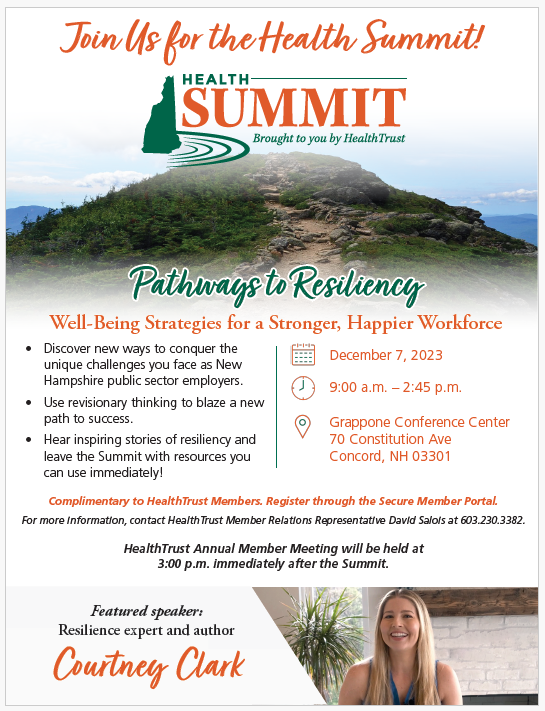The information contained in this article is not intended as legal advice and may no longer be accurate due to changes in the law. Consult NHMA's legal services or your municipal attorney.
According to the American Psychological Association, resiliency is the process and outcome of successfully adapting to difficult or challenging life experiences, especially through mental, emotional, and behavioral flexibility. A resilient workplace can foster more creativity, productivity and happier employees. Consider these tips for fostering a more resilient and happier workforce.
Tips for Creating a More Resilient Workplace
- Understand your employees. According to the American Psychological Association, resilient employees make resilient organizations. People who are supported, motivated and equipped are best positioned to overcome obstacles and distractions. You can learn more about what work-related stressors impact your employees the most by surveying them. Ask how they feel about their workplace, how stressed they feel on a day-to-day basis, and what the biggest sources of stress are for them at work.
- Promote honest communication with your staff. Realize that your perceptions of the organization and experiences at work may differ from those of your employees. Set the example of polite and respectful exchanges of ideas and listen to your employees when they talk about their work experiences.
- Make your employees feel valued: When people feel valued at work, they’re more satisfied, more creative, and more likely to take risks to contribute in positive ways, said Isaac Prilleltensky, PhD, a psychologist at the University of Miami who summarizes the science of mattering in his book How People Matter(Cambridge University Press, 2021). Make your employees feel valued by having frequent check-in meetings where employees can talk freely. Address personal and professional development opportunities with them and offer flexibility in their schedules. These are small changes that could make a big impact on your employees.
- Involve them in decision-making. Include a diverse team in the decision-making process to ensure that opinions from all different backgrounds are heard and considered.
- Encourage your employees to use the resources available to them. If you offer an Employee Assistance Program (EAP), promote those valuable resources. For example, managers at HealthTrust Member Groups can schedule trainings, share online resources, and refer employees to the services available through the LifeResources EAP provided through ComPsych GuidanceResources.
- Encourage Collaboration and Fun! According to the Centers for Disease Control and Prevention (CDC), research shows that social connectedness can lead to a longer life, better health, and improved well-being – which are all components of building individual resiliency! Some ways to improve social connectedness in the workplace include encouraging collaboration across different departments, providing employees a nice space to have lunch together or hosting a fun, non-work related staff event.
- Help them stay physically healthy, too. Physical health and mental health go together and healthy employees are more likely to be productive, happier employees. Make sure your employees understand their health benefits and how to access them.
Trainings and Tools for You and Your Co-Workers
In addition to building a resilient team, consider the following tools and trainings for peers and supervisors.
- Mental Health First Aid: Mental Health First Aid training can take the fear and hesitation out of starting conversations about mental health and substance use problems. It improves understanding and provides an action planthat teaches people to safely and responsibly identify and address a potential mental illness or substance use disorder.
- National Alliance on Mental Illness (NAMI) NH offers a variety of training workshops on mental health, crisis response and suicide prevention. These are offered in person or virtually. NAMI NH is a great, local resource for you and your employees.
- Shield of Resilience Training Course: This free, one-hour, online course is available through the Substance Abuse and Mental Health Services Administration (SAMHSA). The course provides law enforcement officers with a foundational skill set to better understand and address the behavioral health stressors that are unique to law enforcement.
Krista Bouchard is the Wellness Coordinator at HealthTrust.

Attention HealthTrust Members! Learn more about creating a resilient workplace at the HealthTrust Summit: Pathways to Resiliency: Well-Being Strategies for a Stronger, Happier Workforce
Date: December 7, 2023
Time: 9:00 a.m. to 2:45 p.m.
Location: The Grappone Conference Center, 70 Constitution Avenue, Concord, NH
Check your email for registration details.
Sources:
Centers for Disease Control and Prevention (CDC):
National Institutes of Health: https://oitecareersblog.od.nih.gov/2022/11/07/resilience-understanding-and-communicating-your-needs-in-the-workplace/
American Psychological Association: https://www.apa.org/topics/resilience and https://www.apa.org/topics/healthy-workplaces/making-difference-at-work
National Council for Mental Well-Being: https://www.mentalhealthfirstaid.org/ and
https://www.mentalhealthfirstaid.org/take-a-course/what-you-learn/
National Alliance on Mental Illness (NAMI) New Hampshire: https://www.naminh.org/trainings/
Substance Abuse and Mental Health Services Administration: https://www.samhsa.gov/dtac/shield-resilience-training-course

